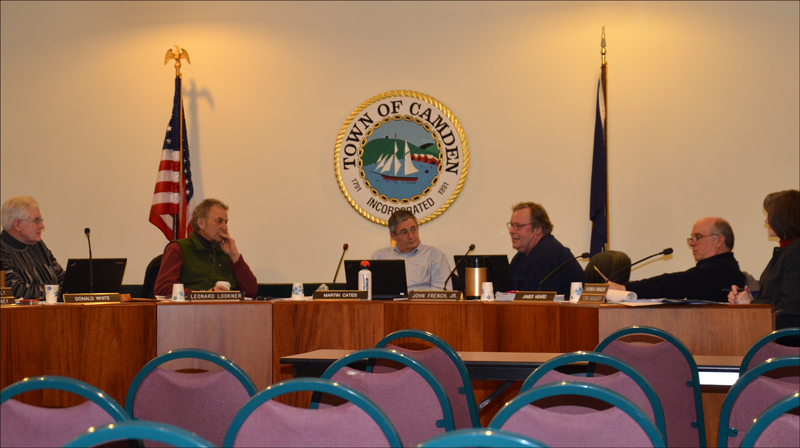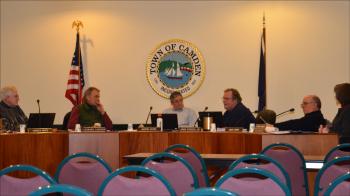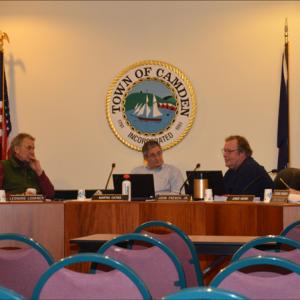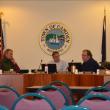Camden leaders vote against formalized conduct code
CAMDEN — Put five men of varying ages between 50 and 70 in a room to talk about instituting a written code of conduct for the governmental body they represent and what results is a thoughtful and thorough debate about whether certain philosophies and behavior should be codified, or just expected.
The Camden Select Board convened Jan. 15 for a workshop and a meeting, tending to business left over from its regularly scheduled Jan. 8 meeting. Besides approving a $42,230 disbursement from Camden's trust funds to seven provider agencies, and reviewing its own longterm goals, the board addressed implementing a code of conduct for itself. The suggestion to adopt such a code had been made last fall, but the board had yet to fully discuss it. Monday night, that happened, with an honest exchange of ideas about the necessity for such a document, and what its content might include.
But the opinions varied, and in the end, the board voted 3 to 2 not to adopt a code of conduct. Voting for the measure were Don White and Chairman Martin Cates; opposing were Leonard Lookner, John French and Jim Heard. Supporters of the measure said such a code was not a list of rules meant to stifle opinion and debate, but a guide to collective expectations. Those opposed, however, worried how code language might be interpreted, and violators penalized.
Board member White had submitted a draft code with 14 points, collected in part from other towns that have such ethics codes, including Kennebunk. The draft contained statements, such as: "Recognize that our responsibility is not to operate the town, but to see that it is well operated" and "Make all decisions based on facts presented and discussed." Other statements included: "Make no disparaging remarks in or out of board meetings about other members of the board or their opinions. Act with civility at all times."
But those statements immediately raised philosophical questions about their meaning, and potential interpretations.
"If someone violates the code of conduct, what's the penalty," asked board member Leonard Lookner. "Is it like an ordinance? What if one of us is involved a tryst? Is that part of the code of conduct. What if one of us is cut off at an intersection and we yell at someone and he or she runs to the town manager and says 'Leonard Lookner yelled at me because I cut him off.' We could spend a lot of time chastising each other for our conduct."
Lookner also said the potential existed that such a code could be exploited to prejudice someone who "does not think like us."
White said that a code of conduct, or code of ethics, "means nothing more that we enter knowing that sometimes silence may be golden. It doesn't mean you can't express your viewpoints. It does express that we temper our viewpoints so we don't throw water at each other."
In general, the board agreed on all proposed points. They agreed that their service on the board is an opportunity to "promote Camden and its citizens and by doing so, making Camden the best place to live, work and play." They agreed that they should conduct their "official and personal affairs in such a manner as to give the clear impression that we cannot be improperly influenced in the performance of our official duties." They agreed to "support all decisions made by the board once the majority vote prevails."
They did not agree, however, that they needed to have those points in an official document.
"I've always defended the majority of the board," said French. "All the things you've got written I try to do every day."
Jim Heard said: "I think that at the grand old age of all of us, we all know the difference between wrong and right, and we all need to follow the golden rule. Does it need to be on a piece fo paper? I'm not certain it does. I believe we all understand these things already."
Martin Cates argued, on the other hand, that: "all our governing bodies [federal, state and many local] operate with some guidelines. Yes, we err on the side of high ethical standards. But that may not always be the case. Demonstrating to the public is an act of good faith."
White agreed, saying the Select Board should set the standard.
"It's time to formalize what we are all about," he said. "We are saying we are doing our level best to live up to these standards. And this sets the benchmark for the rest of our town."
Cates said, "The idea is not to walk round with big stick and whump somebody over the head."
But French reiterated his skepticism of needing a document to spell it out.
"Leonard has his views and I have my views," he said. "We have all said things, but we all as a rule we stick to a code of conduct. We took an oath of office."
Cates said: "The oath of office doesn't have a lot of teeth to it."
"Well, neither does this," said French.
"Sorry, I disagree," said Cates.
Lookner said he feared that such a code would homogenize the board and discourage dialog. But Cates said it was not a gag order.
French said the media sometimes erroneously attributes statements to a board member, when in fact the individual is speaking as a general citizen, not a member of the board.
"At the end of the article, the paper will always put that the speaker is a select board member, even if that person is speaking as a citizen," he said. "Because we do get emotional. And then people think the entire board is behind it [what has been quoted]."
Lookner said that there were certain tenets of moral behavior ingrained in his value system and that he did not need to take an oath for them to exist.
"If people think my behavior is not ethical or moral, that is their interpretation, that is their opinion," he said.
One of the statements, that all decisions "be based on facts presented and discussed," drew skepticism from Heard, who said that it discounts human nature.
"You cannot come in here without an opinion on something," he said. "It's a like a judge who says 'strike that from your memory.' It's not possible."
Town Manager Patricia Finnegan told the board that the proposed code could be useful for future select board members.
"Nothing you read here obstructs your ability to express your opinion," she said. "Anyone running for office in the future, this is helpful to them. Some people don't know. Some people run for office because they want to run the town. As manager, I can't tell select board [members] how to conduct themselves."
"Maybe it is the name of it, the 'code'," said Lookner. "Maybe it should be called guidelines."
"Nothing here prohibits heated conversation from occurring," said Cates.
Lookner referred to the statement that no disparaging remarks be made by select board members.
"Who is the judge and jury on disparaging remarks," he asked. "Act with civility? That's kind of a vague term. What is civility? Public discourse is civility. There could be nothing more civil than public discourse."
French returned to his point that everything contained in the proposed document, "is something that is expected of you. The expectation to act polite, listen, and do your job. It's understood with me."
Lookner asked: "Why would you do the job if you didn't agree with No. 1 [that service on the board is an opportunity to make Camden the best place to live]? Why would we do this if we didn't truly believe we were helping our community?"
"There may be people who run on an agenda," responded Cates.
"That's politics," said Lookner.
French said he was concerned how future boards might use the code, and add onto it.
"Things evolve," he said. "From the simplest, and then things get added and added and added."
"You are prepared to vote for it," asked Cates.
"I did not say I was going to vote for it," said French. "I do not disagree. We all operate on a code of conduct but we don't need it in writing."
White suggested that the board consider adopting a code, but work on its language over the next 30 days.
"Action to me is doing and not writing it down," said. French. "I don't see my opinion changing in 30 days."
Nobody else changed his opinion, either. A final vote, whether to pursue a written code of conduct, was defeated.
Editorial Director Lynda Clancy can be reached at lyndaclancy@PenBayPilot.com; 706-6657.
Event Date
Address
United States

























